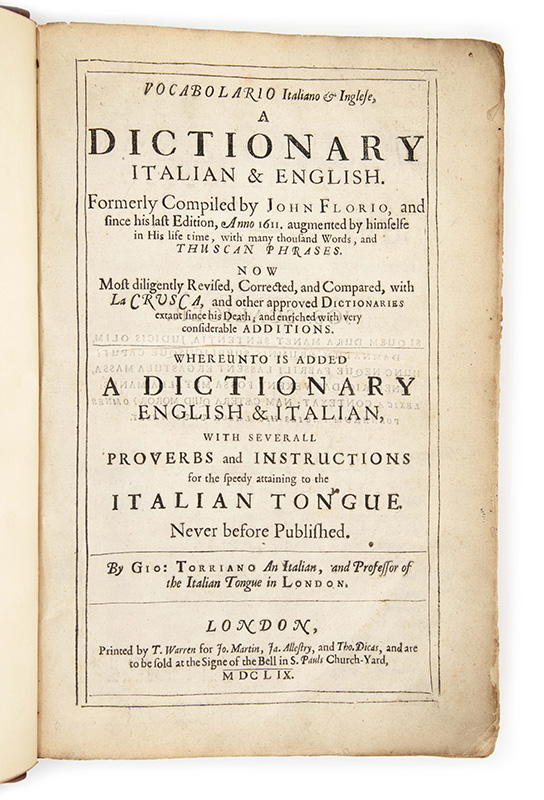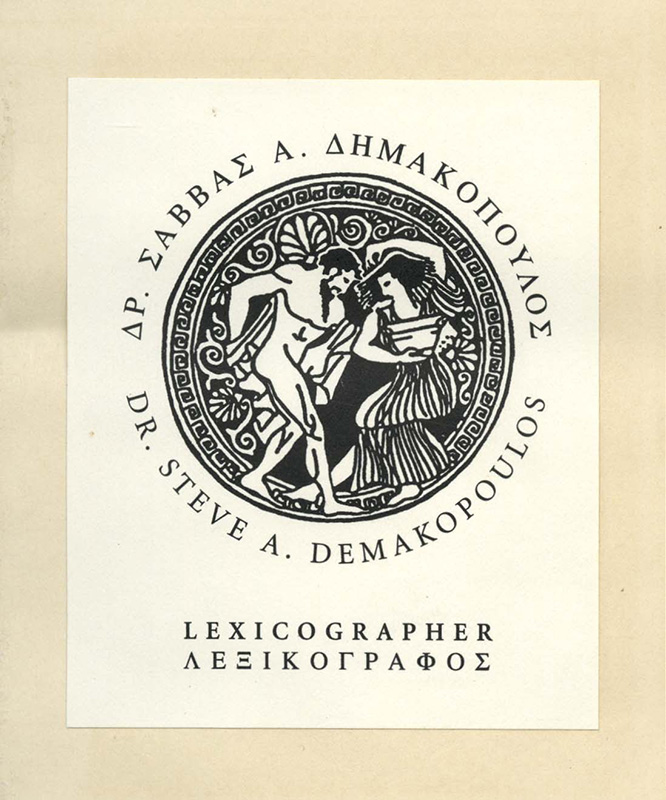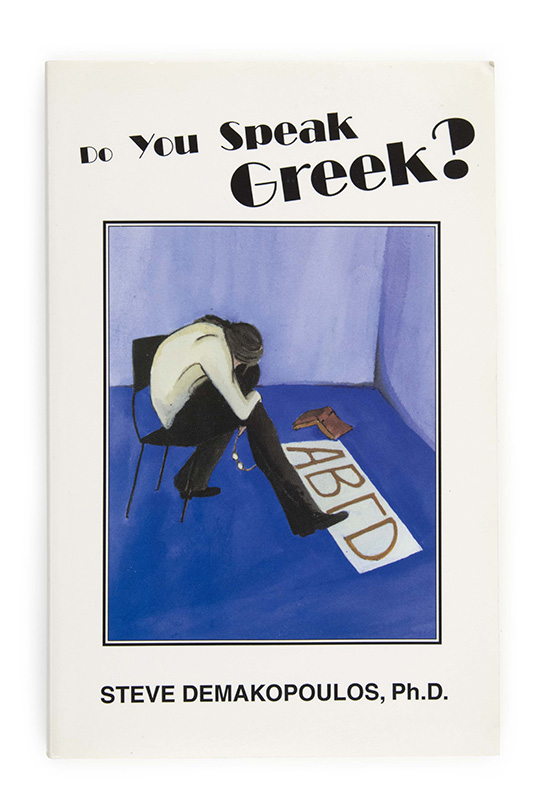John Florio (1552–1625) was well-positioned to write an Italian–English dictionary. His father Michelangelo, an Italian Protestant (of all things), fled to England during Edward VI’s very Protestant reign, and we can assume that Italian was spoken in the home. John was born in London soon thereafter, but Mary I ascended with her incendiary Roman Catholicism — 1553 and all that — and he spent his childhood abroad before returning to study at Magdalen College, Oxford, in settled Elizabethan times. He was a poet, tutor, translator (the first to render both Montaigne and Boccaccio into English), and, eventually, a lexicographer of note. He published The World of Words (1598), the Italian–English dictionary mentioned above, which saw a second edition as Queen Anna’s New World of Words (1611). The very incomplete catalogue we have of Madeline Kripke’s collection indicates that she owned at least two copies of the latter and does not mention the former — but who knows? We’ve barely started unpacking the collection and might eventually find a copy of the original edition.

Florio’s dictionaries were bilingual but one-directional; that is, one could look up only Italian words to find their English synonyms and definitions. Giovanni Torriano (?1609–?1666) — always identified as “an Italian” on title pages of his books but long resident in England, a “professor” of Italian in London and at the royal court— saw Florio’s dictionary as an opportunity. He revised it and added an English–Italian part, resulting in a newly two-directional bilingual dictionary, Vocabulario Italiano and Inglese, a Dictionary of Italian and English (1659). Madeline’s collection includes a fine copy of this work, apparently in a contemporary binding. The text is in three columns, with bold entry words and definitions following in italics. The World of Words is a rare book; Florio-Torriano is “merely” scarce, but to find such a fine copy is nonetheless cause for celebration.
For a collector like Madeline, Torriano’s is an essential dictionary, part of the history of early English and European lexicography. Torriano built his dictionary on foundations laid by many earlier dictionaries, not just Florio’s. Underneath his surface lies a deep, complex, and textually interrelated history of early bilingual lexicography. And he “Most diligently Revised, Corrected, and Compared with La Crusca, and other approved Dictionaries extant since his [Florio’s] Death,” or so the title page announces. His English–Italian dictionary includes “Severall Proverbs and Instructions for the speedy attaining to the Italian Tongue.” Torriano was also the author of The Italian Tutor, or, A New and Most compleat Italian grammer (1640) — his many students needed a textbook as well as a dictionary — a copy of which the catalogue assures us is in the Kripke Collection.
Madeline’s is no ordinary copy of Torriano’s Vocabulario, however. It was, in fact, a more specific target of her collecting, not because it had been owned by the City of Nottingham Public Libraries, as attested by a bookplate on the inside front cover, but because another bookplate, on the first leaf, identifies it as having belonged to Dr. Steve A. Demakopoulos.

Demakopoulos (1930–2006) was an economist who loved the Greek language and wrote about it extensively for a general audience, hoping to win them over to its beauty and cultural importance. He loved dictionaries, too, and became a charter member of the Dictionary Society of North America. Madeline was one of 25 founding members of the society, so she and Demakopoulos knew each other in that context, at least, for decades.
After he died, Demakopoulos’ collection of books in Greek, ancient to modern and including dictionaries, was acquired by Sacramento State University (see https://library.csus.edu/index. php/tsakopoulos-hellenic-collection/demakopoulos), some 3,400 volumes from a private library of more than 8,000 volumes. It resides there in the Tsakapoulos Hellenic Collection. Madeline’s copy of Florio-Torriano was among the non-Greek works sold at auction. I have yet to find evidence of purchase or provenance among the many boxes of Madeline’s records, but hers may be the copy sold on May 19, 2013, by Bonham’s in San Francisco, for $1,125.
These facts and speculations aside, the relationships among Madeline’s copy of Florio-Torriano, her collecting, and her influence in the world of dictionaries is yet more interesting. Madeline’s friends often guided her to subjects, and she snapped up copies of their works, especially those with inserts, inscriptions, bookplates, etc., but in this case Demakopoulos’ previous ownership figured in her curation, as well. Indeed, as we might expect given their long association, the Florio-Torriano was not the only book connected to Demakopoulos in Madeline’s collection.
With incredible serendipity, we found a book by Demakopoulos in a box across the room from the one with the Florio-Torriano on the very same day we discovered that dictionary. The book, Do You Speak Greek? (2000), is his paean to Greek language, literature, and culture. He gave a copy of the book to Madeline, inside which is a note on his personal stationery: “Dear Madeline — Thought you’d enjoy this material. Tried to contact you by phone. Call me when you could [sic].” Their relationship was quite familiar and had been continuous and perhaps even intensive at times, for the following reason.
The book is also inscribed, to this effect: “Dear Madeline, The Greek language in all its beauty, which you well know, thanking you for all the books you found for me. Steve ne Σάbbas [sic] [Savas].” This adds a new dimension to Madeline’s role among dictionary scholars and collectors. She bought Demakopoulos’ copy of Florio-Torriano, partly because of its association with him but perhaps also because she had recommended that he buy it in the first place. Madeline curated her own collection, but she also helped Demakopoulos curate his, much to the benefit of the Tsakapoulos Hellenic Collection, Sacramento State University and Greek and dictionary scholars worldwide. We must ask the question, “How many dictionary collections did Madeline Kripke serve as an expert, an agent, or effectively a co-curator?” We’ll probably find an answer, or perhaps many answers, as we continue to unpack the Kripke Collection.

Leave a Reply